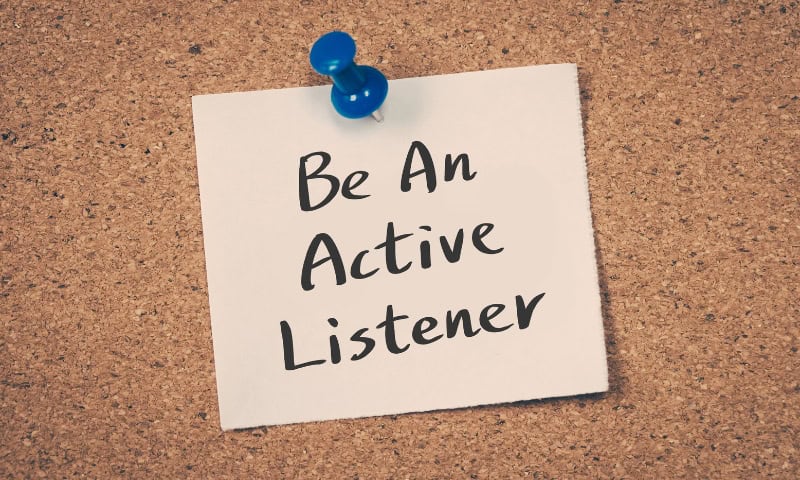Do you or your partner feel unheard and invisible? Feel lonely while being in a relationship? Are self-doubt and relationship stress creeping up on your relationship? It is possible that one or both of you lack listening skills, and that is what is stopping your relationship from blooming and strengthening.
Conflicts are never entirely absent in any relationship. However, if one partner among a couple maintains such a stance where he refuses to pay attention to what his partner has to say during or regardless of a conflict, that can cause a massive fallout at some point.
Oftentimes, people are sunk into the screen while the spouse is talking about his or her day, or isn’t showing any concern about the relationship, which can feel deeply hurtful, if such instances keep happening.
On the other hand, some partners only listen in order to react, which is also a very negative form of communication. As mentioned, while conflicts can be there, having the ability to resolve them is the true strength.
Any relationship, especially romantic ones, depends upon communication. And listening is the most crucial part of healthy communication.
What is Active Listening?
Active listening is where you listen to the other person with empathy, attention, and not with the intention to jump to react. Most importantly, it is when one keeps the communication non-judgmental and free of any distractions.
If you wonder why active listening is important? Active listening is a communication technique that is a conscious, intentional effort to fully understand another person’s complete message and perspective.
This brings clarity between two entities, creates a safe space to share and reflect on one’s thoughts and opinions, and feelings. This helps the relationship to get better gradually and slowly, while helping two individuals to relax and get rid of the consistent stress of a strained relationship.
Benefits of Active Listening?
Developing active listening habits as the relationship grows can gradually heal past wounds and rebuild the lost connection. Active listening helps one to resolve conflicts and address misunderstandings.
Lack of active listening can push one partner into feeling isolated, hurt, and misunderstood. If such a situation continues, the hurt one might shut his or her own feelings down. This leads to suffocation in the relationship.
Reconnect With Your Partner Through In-person or Online Couples Therapy Near Me
Let our experienced therapists at Town Psychological Services help you rebuild trust, improve communication, and rediscover intimacy.
Here are the ways in which active listening helps couples, and how to improve active listening.
1. De-escalating Conflict
When a partner truly listens by giving full attention, validating feelings, and responding with empathy, it restores a sense of being valued and understood.
A person who has been feeling unheard or neglected till now feels better as soon as you validate their feelings and respond with empathy. Feeling validated, accepted, and cared for is the beginning of improvement of the relationship itself.
This stage in conflict resolution in couples helps to lower defenses, diffuse anger, and create space for constructive and helpful dialogue. This allows a common ground to exist where both partners can agree. This reduces the extent of conflict to quite a high extent.
2. Improving Communication
Active listening makes the conversation smoother, pleasing, and fruitful. The ability to have strong communication where both express clearly, honestly, and fearlessly while feeling heard and understood is something to cherish, and active listening brings that into the complex sphere of relationships.
3. Building Trust and Respect
Trust is the essential aspect of any healthy relationship. By practicing active listening, both parties feel heard and validated eventually, which lays a strong foundation for the trust factor to build up in an effective way.
4. Enhancing Understanding and Empathy
Active listening allows you to see situations from the other person’s perspective, nurturing empathy and compassion. This deeper level of understanding helps prevent misunderstandings and enables you to respond more thoughtfully to your partner.
5. Strengthening Relationships
Consistently improved communication, along with a gradual build-up of trust, helps to improve the relationship. While enabling a safe, supportive environment with active listening, allow some fun moments, and enjoy each other’s company to solidify the relationship.
These aspects of the relationship reduce the intensity of the tough patch, if there is any in your relationship. It deepens intimacy and ultimately leads to healthier, more fulfilling relationships and life.
Our couple therapists at Town Psychological Services help couples initiate active listening practices and sustain them. This helps couples with strained relationships rebuild a sense of comfort and rekindle the lost spark eventually.
Active listening is a simple and effective communication tool, which is a genuine way to address any trouble. It helps people share their concerns and allows them to open up, while it also teaches them how to contribute to keep the relationship healthy. It nurtures relationships and allows you to create an environment of trust, respect, and open communication.
Ready to Improve Communication and Connection?
Take the first step toward a more fulfilling relationship—book a consultation with our couples therapy specialists today.
Closing thoughts
Active Listening creates a room for the couple to experience calm and have a thriving and happy relationship. In order to take a step-by-step approach for the same, do get in touch with a couples therapy expert to equip yourselves with the right tools to manage your relationship and life.
Active listening is a vital life skill that nurtures trust, respect, and emotional safety. In such a complex and fast-paced world, the ability to slow down and listen deeply may be the key to resolving conflicts, strengthening relationships, and having a more harmonious environment.
Additionally, by practicing techniques such as summarizing, asking clarifying questions, and emotional labeling, individuals can transform disagreements into opportunities for growth and connection.

